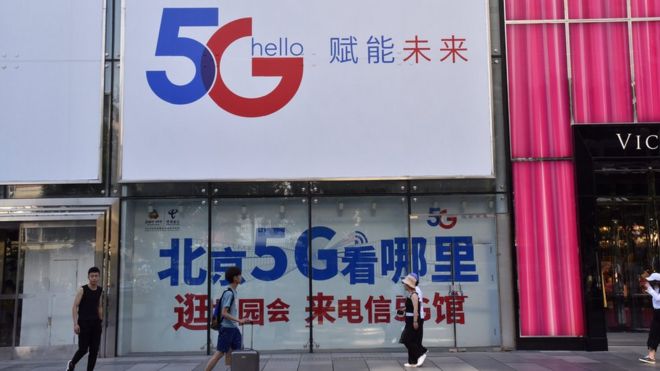Find out the week’s top mobile stories from around the world.
This week.. China rolls out ‘one of the world’s largest’ 5G networks, smartphone market shows signs of life, Australia says Google misled consumers over location data and much more.

China rolls out ‘one of the world’s largest’ 5G networks
BBC
China’s mobile operators have made 5G services available to consumers, as the country seeks to become a global technology leader. State-owned carriers China Mobile, China Unicom and China Telecom unveiled their 5G data plans on Thursday.
It comes as Beijing and Washington have been embroiled in a power struggle over trade and technology.
Read more…
For the first time in two years, the smartphone market shows signs of life
Tech Crunch
All is not lost for smartphone manufacturers. On the heels of two years’ of global stagnation, the category is finally showing some signs of life. Much of the bounce back comes as manufacturers are working to correct for dulled consumer interest.
I wouldn’t put too much weight in the numbers right now, as they’re little more than an uptick. Numbers from Canalys put shipment growth at 1% from Q3 2018 to Q3 2019. In most cases, that would be a modest gain, at best, but this is notably the first time in two years that the numbers have been heading in the right direction.
Read more…
Mobile firms face big fines for missing new rural coverage targets
Tech Radar
Mobile operators in the UK could be fined as much as ten per cent of their annual turnover if they fail to honour new commitments to improve rural coverage.
Last week, the government announced a £1 billion ‘Shared Rural Network’ (SRN) that should see operators extend coverage to 95 per cent of the UK landmass by 2025.
Read more…
Google Misled Consumers Over Location Tracking, Australia Says
New York Times
Australian regulators on Tuesday accused Google of misleading consumers about its collection of their personal location information through its Android mobile operating system, the latest government action against a tech company over its handling of vast quantities of user data.
The Australian Competition and Consumer Commission alleged in a lawsuit that Google falsely led users to believe that disabling the “Location History” setting on Android phones would stop the company from collecting their location data. But users were actually required to also turn off a second setting, “Web and App Activity,” that was enabled by default.
Read more…
Belgian city slurps mobile data to track visitors
The Register
The Belgian city of Kortrijk in West Flanders is using data provided by a mobile phone company to count the number of people present in the town and where they come from. Even more worryingly, local public-service broadcaster VRT has reported that city officials will try to cross-reference this data with credit and debit card databases.
Kortrijk is a popular tourist destination: between July and August, 799,336 people visited the town, almost 20,000 a day when students, employees and residents are excluded.
Read more…
India asks WhatsApp to explain privacy breach
Reuters
India, WhatsApp’s biggest market with 400 million users, has asked the Facebook-owned (FB.O) company to explain the nature of a privacy breach on its messaging platform that has affected some users, Technology Minister Ravi Shankar Prasad said.
“We have asked WhatsApp to explain the kind of breach and what it is doing to safeguard the privacy of millions of Indian citizens,” Prasad said in a tweet on Thursday.
Read more…
Uber Money: How Big Tech is reinventing mobile payments
Decrypt
Ride hailing app Uber has taken a deep dive into financial services. On Monday, it launched a new digital payments service, Uber Money, aimed—initially at least—at its four million drivers. The move places Uber alongside other companies racing to capture the mobile payments market, including Facebook, Telegram and Kik.
Uber Money offers drivers a digital wallet complete with overdraft facility, debit and credit cards, and 5% cashback on other Uber services.
Read more…
In-app advertising: How marketers can take advantage of rising CPMs
The Drum
Effective cost per thousand (eCPM) in the in-app advertising industry saw a 27% increase globally in the first quarter of 2019 compared to the previous year as advertisers’ desire to gain the attention of engaged mobile users soared.
Delynn Ho, the general manager for APAC at Smaato explains the increase is just like with any dynamic marketplace, where supply and demand determine pricing. She notes this is especially true in many developed countries, where the quantity of smartphone users is relatively fixed and has nearly reached maximum penetration.
Read more…
How AI is changing mobile advertising in 2019
E27
From hyper-personalisation, predictive analytics, content creation to fraud detection, we are seeing AI creep into our daily lives as both advertisers and consumers. According to Gartner’s survey of CIOs, “14 per cent of organisations employ AI and 50 per cent intend to do so in 2020”.
At its core, AI pertains to the use of machines and their ability to continuously learn and solve problems. Algorithmic advances in AI like deep learning came at the right time for mobile advertising, these advanced techniques are immensely powerful and are capable of capturing complex non-intuitive patterns.
Read more…
IoT Security: The Internet of Threats?
Silicon
With billions of connected devices, IoT will deliver a new data-rich environment. However, will this new space be safe and secure?
According to the latest estimate from Ericsson, by 2024 there will be 22 billion connected devices in the world. From sensors on public transport to intelligent devices in our homes, IoT looks set to change our world out of all recognition. With so many smart and connected devices, IoT security is vital.












